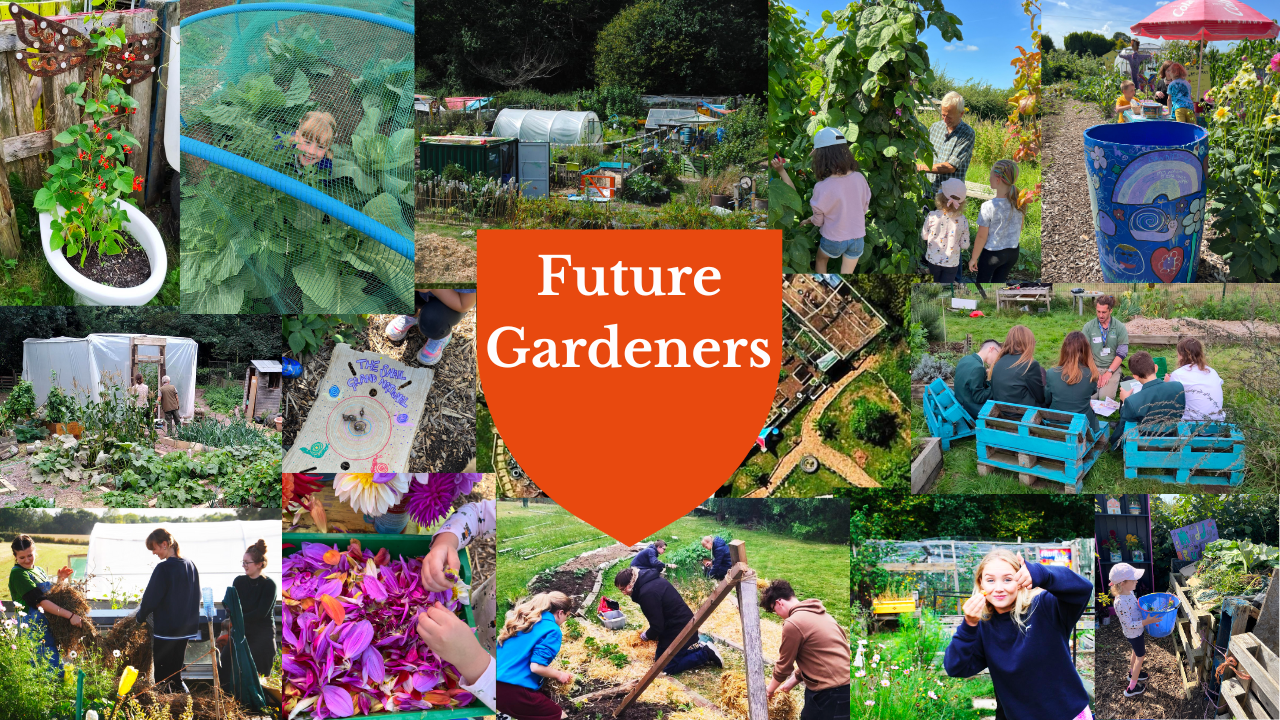
Dear Gardeners,
A huge thank you to all who attended our second Future Gardeners Forum on 12th March. It was a pleasure to hear from our six inspiring speakers who each teach children to garden in their own unique way. There were so many ideas to take away, see the full write-up below.
Our hope is that any of you starting a project feel ready to take the plunge. The rewards are there not just for the children but for the guiding adult too.
Spring has firmly sprung, and we have dry conditions in the UK at least. I love this time of year when the beds at Homeacres start to fill with so many different seedlings from the greenhouse. They are all covered to increase warmth and protect from pests.
Here in central southwest England, we can still have a frost, so I have not yet sown any of cucumber, courgette, squash or summer beans. Only melons are sown today, 1st April, on the hotbed. Cold temperatures at night simply stops germination.
Not only is the garden busy, but my calendar is too. I’m looking forward to so many events, course days and workshops in the months to come, and I find that the connections I make help guide my work.
This past weekend, Sue Mizon attended my day course and it was lovely to meet her and hear about her school garden. We feature a second piece written by Sue in this newsletter.
We also learn how Abbie Cheesman is home-educating her son with a connection to nature and growing being central to all they do. Finally, William and Vernie DeMille have set up a school for young adults in Nevada. They offer a journey of self-discovery with gardening and ecology as tools for growth.
Do get in touch with us if you would like to share your project.
Happy gardening,
Charles
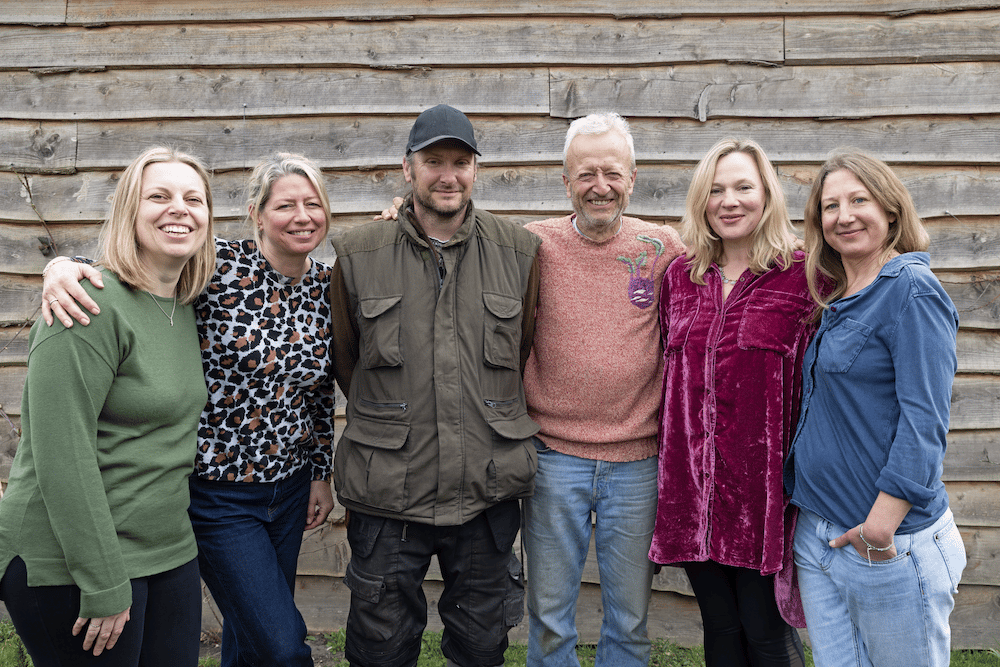
The Homeacres Team! From L-R: Rachel, Nicola, Adam, Charles, Julia, Anna
Future Gardeners Forum 2025 🎤
Our second Future Gardeners Forum was a huge success; you can watch it here, on YouTube.
Here is a little more about each of our speakers.
I’ve had the pleasure of meeting 11-year-old Alby Jones on a few occasions. He discusses the wonderous world of gardening and how he loves all its different aspects. “Children aren’t the problem, it’s the grown-ups. The grown-ups don’t give children enough opportunities to get gardening.” Alby was full of ideas and spoke so confidently. @no dig kid
We then met Beth Rochford of Rootz Up. Beth jumped into gardening a year ago after seeing the work of Lara, who runs Skoolbeanz. She now runs after-school gardening clubs, and clubs for toddlers and parents. Beth really showed us that keeping things small and manageable at the start is the way to go. @Rootzup
Karen Waterston works at a high-school garden in Catalonia, Spain, and gardens with 11 and 12-year-olds. The garden was started 3 years ago, and the children do lots of experimenting. Karen had so many creative ideas to share with us, from building supports for peas to watering systems. @gardenofideas
Helen Cross has been working with children for a long time and volunteers with her local school in Glasgow. She says it’s all about getting your hands dirty. Helen grows lots of veg with the children and, more recently, they’ve started a cut flower garden to sell locally. “I don’t know any child that doesn’t like to make a bit of money”. @grow_cook_inspire
Tom Houghton in Lincoln has a large market garden, which he acquired after leaving life in the corporate world. He has developed a relationship with the school nearby and now runs a Young Farmers Club. “As they have been growing the vegetables, it’s great to see them trying and tasting new things, and they now have a better understanding of where their food comes from”. @thecommunitygrowers_cic
Ross and Hannah started Letting Grow over five years ago and focus on enhancing people’s connection with nature. They work with different schools and plant lots of trees with the help of the young people they work with. “The more in touch with nature you are, the better it is for your mental health”. @lettinggrow
Everyone spoke so brilliantly and passionately about their different projects, so I hope you enjoy watching or rewatching the forum.
The amazing power of no dig, organic gardening – a home education perspective 🪴
Contributed by Abbie Cheesman
Rewind to April 2020 and, like people up and down the country, we made a random lockdown purchase wondering how we were going to keep ourselves entertained and sane as the initial few weeks of isolation looked set to stretch.
Whilst other people were buying gym equipment and hot tubs, we decided on a 45-foot polytunnel, meaning our little boy Lowen (then just under 6 months old and now, somehow, 5 years old) spent much of his early life crawling and staggering around through tomato plants and nibbling salad leaves.
Fast-forward to summer 2024 and we decided, after being lucky enough to have Lowen at home with us for the last few years (quite the juggle!) that we were going to formally register as home-educating. Those days in the polytunnel continue!
However rather than trying not to wince as toddler Lowen careers through a newly transplanted bed, Godzilla-like, we now have an expert grower on our hands who can see when things need watering and picking and who is confident to be left to dead-heading (my least favourite job so happily handed over!).
Like people who choose to grow their own fruit and veg in some way, shape or form – from allotments to window boxes – families choose to home educate for a variety of different reasons. One of the major benefits for us is that our time outdoors is only restricted by how good our waterproofs and woollies are, and quite how savage the Cornish wind is that day!
For a 5-year-old boy, with the tornado-like energy they have at this age, the fresh air and practical tasks, the chance to get muddy and wet (and get me muddy and wet!), and the unhurried pace, are a perfect fit.
Freedom from distractions (for us all) make for great conversations, learning experiences and family time. Having to slow down and concentrate on planting small seeds, watering tiny seedlings with care or harvesting just what we need is great for both his developing body and mind.
For us, Lowen growing up with resilience is really important. We feel that being able to grow some of his own food, know what to do with it to make it into a meal and understand why no-dig and organic choices are important for our own health, and for that of the plants and wildlife around us, already gives him a sense of purpose, responsibility and independence - helping him connect with nature and his place in it. And not to sound too wild, but in a world where many adults have very real fears about climate change, pandemics and global political upheaval, these skills might one day prove more useful than we can imagine.
We are lucky to have an old homestead with an orchard and space for a polytunnel, growing beds and, until the storms last weekend, a greenhouse (which is no more!) The polytunnel for us is as much a physical classroom as a metaphorical one. We eat lunch in there often to escape the rain and marvel at what’s growing (or not!), get our hands dirty and get a dose of nature. That time provides the platform for much of Lowen’s learning – thankfully it always provides an abundant crop of experiences and ideas for other things to do, as well as learning moments.
Random mushrooms appearing in the woodchip lead to a new book about fungi, chats about dangerous mushrooms and pique our curiosity as to why the mushrooms in story books are always fly agarics! Hearing a pheasant in the field provides an opportunity to talk about native and invasive species and the ethics of shoots, as well as food chains.
A buzzard flying overhead sparks interest in the different shapes of birds’ wings and how they fly in different ways, and whether any birds are big enough that Lowen could actually fly on their back like Little Billy in The Minpins! The amazing shapes and colours of snapdragons leads to conversations and reading about pollinators, colours and smells of flowers and companion plants in the polytunnel.
Accidentally cutting too much parsley leads to a lovely idea for giving some to our neighbours and a chat about the concepts of excess and deficit – which gives a great opportunity to talk about consumption, marketing and things like droughts.
Once the polytunnel and veg beds provide the initial spark, for us, books (my second great passion after veg growing) come next! Charles’ own book, the great ‘Mushrooms Know’, the RSPB children’s books on birds, the Ladybird ‘What to look for in . .’ books about seasons and a whole suite of Usborne books – Peep inside bug homes, peep inside a bird’s nest, why do we need bees? Why do we need worms? And the brilliant ‘it all starts with a seed’ are all lovely resources for younger children that we have really enjoyed and would have no hesitation thoroughly recommending to all educators – teachers and parents alike.
We aren’t big on screens at home, but the addition of a new character, Baaz, and his community farm to the Paddington series has also been great for covering topics like upcycling and composting!
All the skills that you need in the garden – patience, curiosity, reflection and learning from mistakes, planning and nurturing – are those that I’m sure we collectively hope the children around us will grow up to have.
I’m excited that, through Charles and his team and the Future Gardeners community, there’s an opportunity for all of us who have an interest in or responsibility for educating our children - teachers, volunteers and parents – to share ideas, learnings and resources!
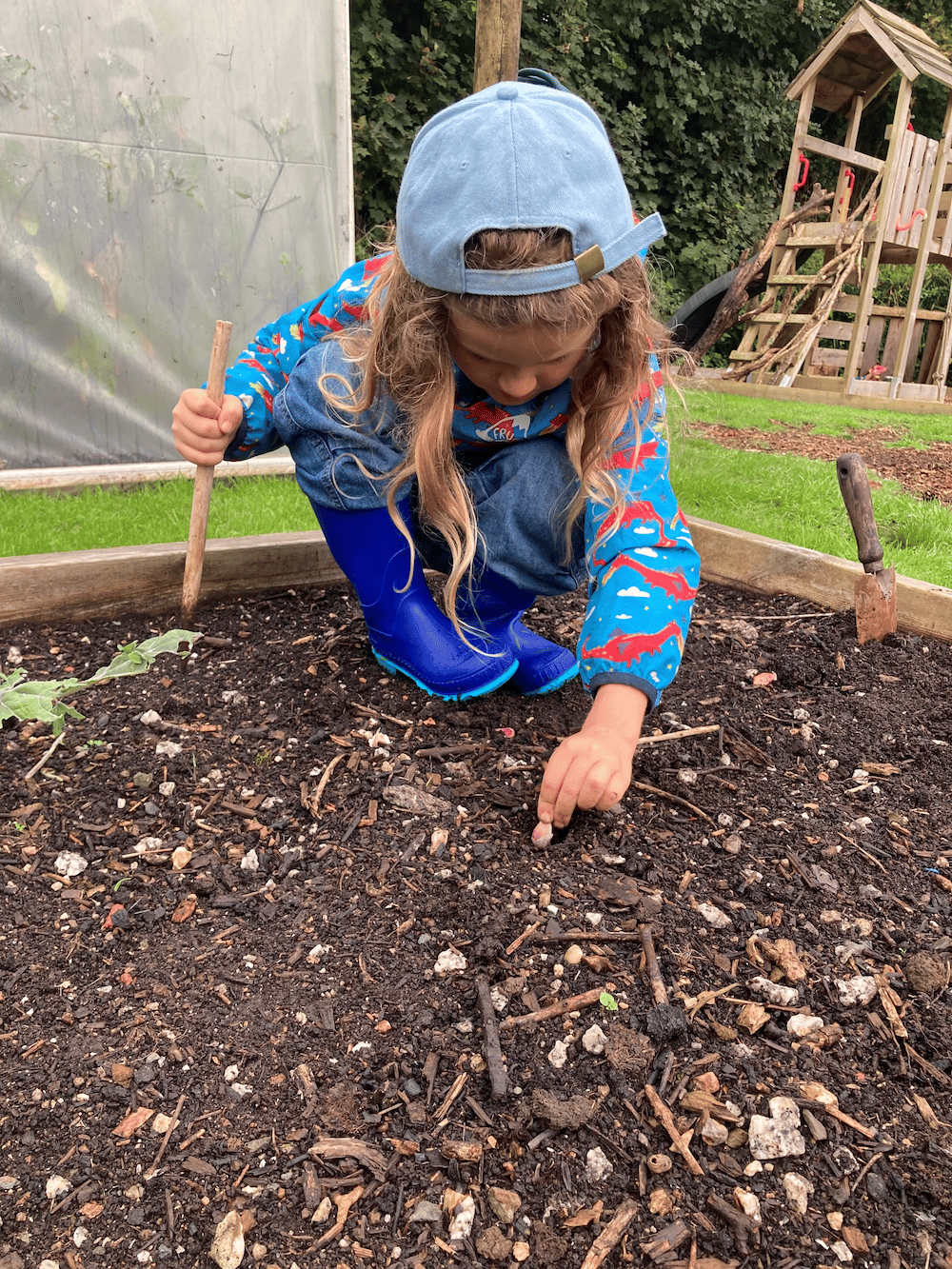
Year One of gardening at Maindee Primary School in South Wales, and there is virtually no gardening equipment 🧹
Contributed by Sue Mizon
On my first afternoon, when I asked what gardening tools were available to use with the children, I was shown a small basket with a few trowels and hand forks in various stages of disrepair. Apart from caretaker Ken’s spade, shovel and rake, the only other tools available were two sweeping brushes. There was no money to buy any more, so where to begin?
I had recently signed up for a networking app on my phone called ‘Nextdoor’*. It puts people in the same area in contact. Lots of the posts are questions like,’ What day is the recycling starting after the Christmas holidays?’, or ‘Has anyone seen a grey tomcat who answers to the name of “Peter”’? I thought it might be worth putting out a call-out for unwanted gardening tools.
I sent the message, explaining who I was and why I needed tools and gardening equipment. Within hours, I had offers of pots, plants and tools from various kind-hearted local people. I discovered that most of us have unwanted ‘stuff’ we are only too glad to give to a good home. I collected the entire contents of a large shed from an elderly lady who had given up gardening due to ill health. On subsequent occasions, we put out calls for seat cushions to make a seating area in the courtyard. Lots of cushions were offered and even a parasol and base. Last year, the school was starting a project led by mothers who wanted to learn how to sew, and a couple of hours after posting, I had been offered three sewing machines.
Our ‘Nextdoor’ have been so supportive and kind – when I asked if anyone had an unwanted flower press or any coach-bolts and nuts so we could make our own for a new project, I was offered not only a flower press and plywood to make our own, but a retired rural studies teacher offered to come in and teach the children how to make museum quality pressed flowers. One neighbour posted, ‘The work you are doing with the children is wonderful – tell me how many coach-bolts you need and what size, and I will buy them for you’.
A few weeks before the end of the financial year, I got an email post from our local Association of Voluntary Organisations** that I had signed up for. It detailed pots of money that were still available if you could get an application in quickly. With the help of senior staff, I wrote a bid for the Newport Community Endowment Fund***. In a matter of hours– working full-out to provide all the information requested, price-up what we wanted and make a convincing argument for school gardening – I applied for £2,000 to buy the largest greenhouse we could get. Two weeks later, we had a letter to say we had been successful.
Just before the end of term that year, a friend told me a local micro-brewery was celebrating its birthday by giving out small grants to local causes. That application brought us £500 to spend on tools.
We had begun the year with almost nothing and ended it with enough tools for every child in a class to be using something, every size of pot and planter you could imagine, and many other helpful bits and pieces. With our birthday grant money, I ordered plenty of watering cans, as every child wants to water plants, and lots of sweeping brushes, as I discovered they also all love to sweep! I learnt the importance of telling people what you are doing and asking for what you need – it is amazing how often you will get it.
It is my fifth year at Maindee now, and things have moved on amazingly. I now work in a team with the wonderful Sarah Debnam and Jo Tymms, and instead of gardening with one class, we provide a day of gardening, forest school or nature activities once a fortnight to over 200 children.
We have had so much regular support on ‘Neighbour’, from a few elderly neighbours who responded to almost every post – one lady pestering all her carers for their children’s out-grown wellies for us – that we decided to invite them in to see the gardening and meet some of the children. One September afternoon I went and collected four neighbours in my car (average age eighty), and the year 5/6 class served them with cups of tea and Welsh cakes they had made that morning. Having been warned that one of the ladies had recently been ill, the children held the arms of their guests as they shepherded them around the courtyard, as though they were made of porcelain.
We had been using the amazing book by Robert Macfarlane called, ‘The Lost Words’ to bring nature vocabulary vividly to life for the children. Just the week before, we had been to forest school to collect blackberries and to observe the ‘arching’ bramble stems. The blackberries went into the school deep freeze, to sit until the dark winter days when gardening wouldn’t be possible, when we would make them into blackberry jam to eat on home-made scones.
The visit ended with the children reciting poetry they had written in response to the ‘Lost Words’ poem, ‘Bramble’, and their singing of the traditional Welsh song, ‘Calon Lan’. Three of the ladies cried as they listened to these children from all over the world singing in Welsh and signing along in British Sign Language.
* This is nationwide with a distinctive lime green logo
** ours is called ‘GAVO’, but they exist in all areas
*** I believe this fund, in different names, is available in many local authorities
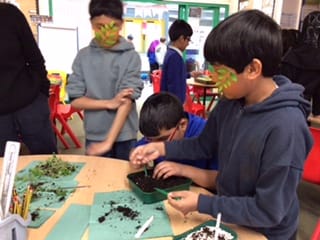
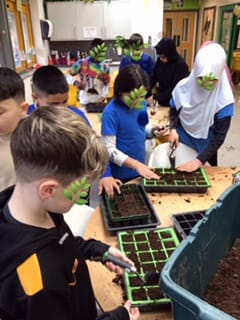
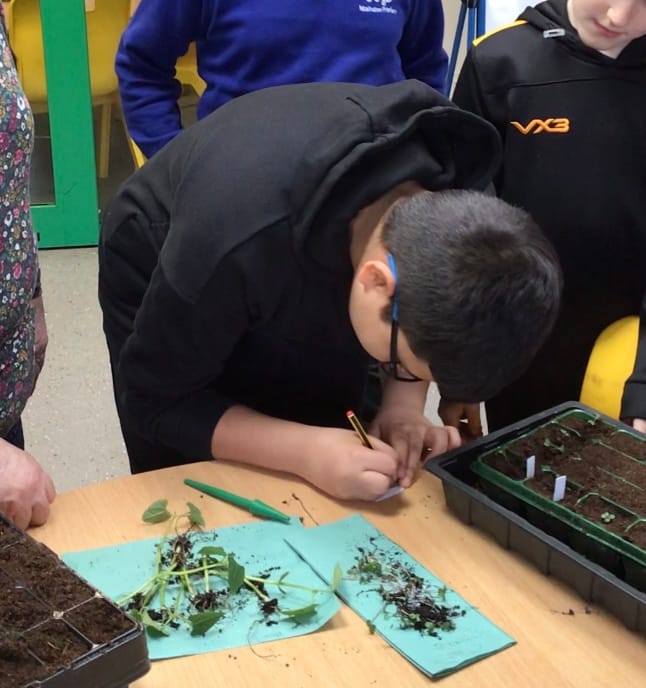
Your projects 🌱
Would you like to share your experience of growing and gardening with children?
However large or small your project, we would love to hear from you.
We hope that by showing what’s possible, others will be encouraged to get started with their ideas.
Please email Nicola: [email protected]
William and Vernie DeMille introduce their Georgic Schoolroom in Nevada, USA 🏔️
We’re excited to share a transformative opportunity for young adults seeking direction and purpose in their lives. Having observed the unique challenges faced by young people, we created the Georgic Schoolroom as a personal development program designed to guide participants toward their individual missions in life. Through hands-on gardening, homesteading, and deep self-reflection, this program provides tools and experiences to help young adults discover who they truly are and how they can serve their communities.
The Georgic Schoolroom is more than a farming class; it is a life-changing experience. Over the past three years, our students have gained confidence, clarity, and purpose—even if they had no interest in farming. While we use gardening and ecology as tools for growth, the real focus is on personal mission development. Our remote Nevada farm, nestled beneath snow-capped mountain peaks, offers the perfect setting for this journey of self-discovery. Here, students learn practical skills like planting seeds, pruning branches, and crafting homemade goods while engaging in deep conversations and moments of quiet reflection. They leave with renewed purpose, healed spirits, and a clear path forward. We’ve seen lives transformed, and we know this program can make a difference for so many others.
We need your help to spread the word! Many people have not yet heard of the Georgic Schoolroom, but with your support, we can change that. Share this opportunity with your friends, families, and communities to help us reach young adults searching for an alternative to traditional college. If you know someone feeling lost or unsure about their next steps, this class could be exactly what they need. To learn more about what we offer and how to get involved, please explore the links below. Together, we can inspire and guide the next generation of leaders and change-makers.
Links to Learn More and Share:
Watch Our Video about the Georgic Schoolroom
Watch Our Webinar about why I created the Georgic Schoolroom
We’ve also created a quick Google Form to gather emails and connect with those interested—it’s an easy way to learn more or stay updated. Thank you for helping us share this mission of growth, purpose, and transformation.
Testimonials:
“I thought the Georgic Schoolroom was all about training Georgics who could raise food. I was wrong. Williams's actual crop is souls. Including the soul of my son. He found confidence and responsibility. He found connection. He found stillness. And he left with the passion to live his mission”. ~ Tiffany Earl
“William, thank you for the Georgic Schoolroom. I’m so happy I got to come this summer. I have become a new person because of this experience”. ~ Student 2024
“The Gerogic Schoolroom is the environment for souls to flourish and connect”. ~ Student 2024
“I want to share a poem by Edgar A Guest: “It Couldn't Be Done”.....
Thank you, William, for inspiring me to do “what cannot be done”... The things that I was born to do! ~ Student 2023
Resources 📋
To help with the planning of a school garden, please see this page of my website.
For a Sowing Timeline in the Northern Hemisphere, please see this page, and for the Southern Hemisphere, please click here.
For starting a new no dig allotment or garden, this is the page.
First Tunnels offer schools a 20% discount. Do see their page here, where they feature the Future Gardeners Forum!
We would like this resource list to grow and turn into a toolkit to help set up and run a successful growing space for children, so if you have any resources you think would be helpful, please email Anna, [email protected]
Contacts 💻
Below are the contact details for the Future Gardeners Forum speakers, 2024 and 2025. Do follow along with their projects via Instagram or their websites.
2025 forum speakers
Alby Jones, @nodigkid
Beth Rochford, @rootzup
Karen Waterston, @thegardenofideas
Helen Cross, @grow_cook_inspire
Tom Houghton, @thecommunitygrowers_cic, @thebostonmarketgarden
Hannah and Ross, @lettinggrow
2024 forum speakers
Lara Honnor – Skool Beanz
@skoolbeanz
Jess Creasey – Cornwall Grows CIC
@cornwallgrows
Phil Brown – Headteacher, Bottesford Junior School
Website: https://www.bottesfordjuniors.com/school-garden/
Sarah Alun-Jones - GROW
@wearegrow
https://www.wearegrow.org
Dan Romans-Hay – Woody School Farm, Streatham
@woodyschoolfarm
[email protected]
Matt Willer – The Papillon Project
@thepapillonproject
https://www.thepapillonproject.com

